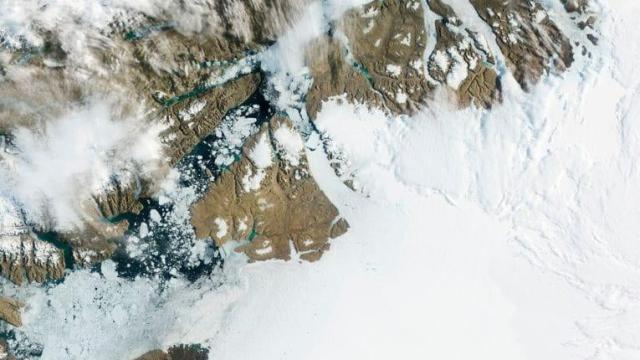A large glacier in Northwest Greenland is melting far more rapidly than previously thought, which could mean faster global sea level rise. In a new study published in Proceedings of the National Academy of Sciences, researchers at NASA and the University of California Irvine explained that the Petermann Glacier’s interactions with increasingly warming ocean tides are causing that glacier to retreat faster than previously observed.
Scientists used satellite imagery to observe the ice and noticed that the Petermann Glacier was bobbing around in response to ocean tides. The glacier’s grounding line, which is where the ice stops touching the land bed and floats, changed with the tides. From 2017 to 2022, researchers observed that the grounding zone retreated 1.6 kilometres on the western side of the glacier, and 3.7 kilometres at the glacier’s centre, the study said. The movement and warmer tides melted a large cavity that was 204 metres tall in the underside of the glacier.
If those ocean interactions continue, it would mean that sea level rise from melting glaciers would happen faster than scientists previously thought. This is especially alarming because current global warming models may have to be adjusted to include how melting observed at glacial grounding zones will contribute to sea level rise. The process could create a cycle: warming oceans melt glaciers, which causes sea levels to rise, which means more contact between glaciers and the ocean, which means more glacial melting.
“These ice-ocean interactions make the glaciers more sensitive to ocean warming,” Eric Rignot, a NASA Jet Propulsion Lab research scientist, said in a statement. “These dynamics are not included in models, and if we were to include them, it would increase projections of sea level rise by up to 200 per cent – not just for Petermann but for all glaciers ending in the ocean, which is most of northern Greenland and all of Antarctica.”
The findings are also worrying because the “Greenland Ice Sheet has lost billions of tons of ice to the oceans in the last few decades,” which has increased sea levels by 14 millimetres since the early 1970s, researchers wrote in the study. And ocean temperatures have increased over time, creating even more conditions where warming waters would deplete glaciers even faster. Already rapidly observed sea level rise is threatening coastal cities all over the world.
